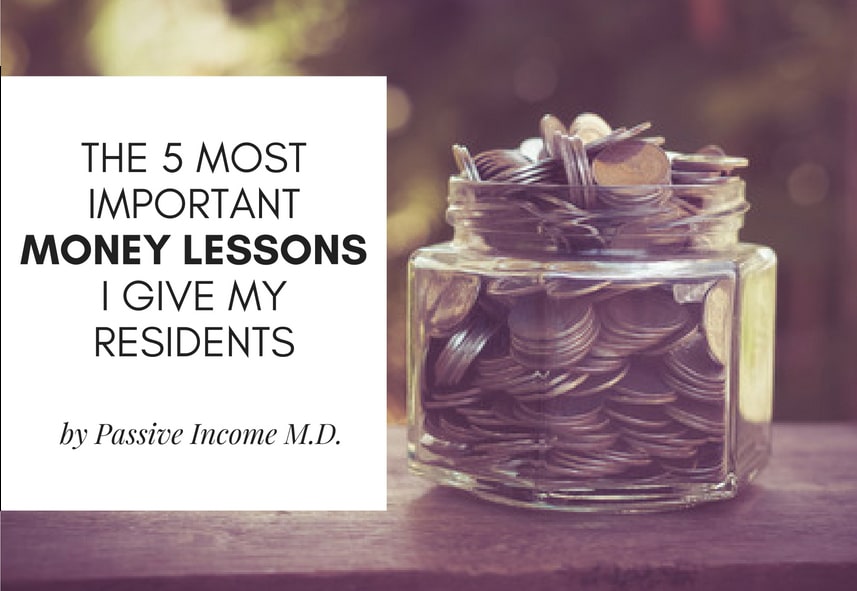
The 5 Most Important Money Lessons I Give My Residents
This post may contain links from our sponsors. We provide you with accurate, reliable information. Learn more about how we make money and select our advertising partners.
A large part of my job is teaching. In fact, every day I teach both residents and fellows. The subject matter is mostly anesthesia-related, but I can’t help throwing in some financial lessons I’ve learned along the way.
We just don’t get any financial education in our normal training, and I feel it’s a great disservice, not only to our future careers but our lives as well. For this reason, unfortunately, it’s up to us to self-educate.
When I’m teaching my residents, I feel that it’s important to impart some of my own hard-earned knowledge, so they can avoid costly financial mistakes and ultimately go through life with less weight on their shoulders. Here is some of the best advice I can give any of them.
1) Read, Read, and Read Some More
As I mentioned earlier, we simply don’t get any this type of education in training or in school, so it’s up to us to seek out and consume the information ourselves. Two books that have shaped the way I think about money and life are Rich Dad, Poor Dad and The Total Money Makeover. As a starting point into setting yourself up the right way financially, you’d be hard-pressed to find two books better than these. Looking for more books? Check out my favorite financial and investing books.
There is also a plethora of good blogs out there with loads of helpful information.
We should always be in a state of learning. After all, how should we expect to be smart with our money if we haven’t dedicated any time to learn about it? The resources are out there, we just have to go out and feed ourselves.
2) Get a Handle on Your Debt
We all know this. Debt is bad… well, debt that doesn't create more income for you or increase your asset value is bad. At least, we know it intellectually. But we often forget this in practice. I’ve heard many residents say, “I already owe so much in student loan debt, what’s a little more credit card debt?”
Developing good habits of not piling on additional monthly debt now will help you greatly when you become an attending and see a jump in your income. And of course, you should consider consolidating your student loan debt at a lower interest rate.
3) Start Investing Now
Whenever I suggest this to residents, they usually say the same thing: “I don’t have any money right now; I’ll start when I’m an attending.” Honestly, a lack of money is a valid point. However, I also happen to be Facebook friends with some of these same residents, and I see photos of food eaten at some of the trendiest restaurants in the city, as well as some amazing travel photos.
Now, I’m not saying you shouldn’t enjoy yourselves; you work hard; you deserve it. However, setting good financial habits as a resident is very important. Whether it’s $5 or $5000, put something away, for example, into a Roth IRA, and you’ll start to care. It’ll motivate you to think about investing and cause you to learn more about it. I wish I had paid more attention to this when I was a resident.
4) Seek Advice From Attending Physicians
Talking too much about money in medicine seems almost taboo, especially while you’re in training. You might be concerned that people will question your motives about going into medicine. But trust me, in today’s environment, if money was your main objective, you probably wouldn’t be in medicine. There are certainly easier ways to make money than by spending 12-15 years accumulating debt before realizing a decent income.
When it comes down to it, money is simply a tool; a means to an end. Striking the right personal balance in life between your family, career, free time, and income is the key to happiness.
Seek out those attendings who seem to be the most content, seem to have it all together, and ask them for advice on how to achieve this balance. You’ll be surprised at what you learn.
5) Don't Wait To Donate
This probably sounds counterintuitive. Most residents feel like they’re overworked and already underpaid. Adding in donations? Most people scoff at the idea. However, I’ve found that giving money can be tough at any stage of life, no matter how much you make.
See, it’s not the amount you give, but more so the mentality. I’ve found that when you give, whether it’s a lot or a little, it changes your perspective on life. You become a little more appreciative of the things you have and become smarter about how you handle it.
I’ve heard it again and again from successful people. When they incorporated giving as a normal habit in their lives, they became happier. In contributing something good to the world, they found that they actually felt more content in their own lives.
Final Thoughts (To My Residents)
The habits you form at this early point in your life will shape the rest of your career. Will you go into the coming years with a sense of financial peace, or will money be a constant cause of worry and stress? The choice is entirely up to you, and making it now is one of the best things you can do for yourself.
Stay informed and updated with current news that will assist you on your journey towards financial freedom. Sign up below to receive our FREE Friday Newsletter…
Disclaimer: The topic presented in this article is provided as general information and for educational purposes. It is not a substitute for professional advice. Accordingly, before taking action, consult with your team of professionals.

